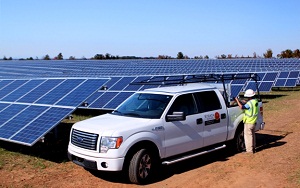Duke Energy edges up on solar owners list in latest SEPA rankings
 Partly because of its recent merger with Progress Carolinas and also because of its own purchases Duke Energy has edged up into the Solar Electric Power Association (SEPA) annual utility rankings report, “2012 SEPA Utility Solar Rankings”, which it issued earlier this month. With an accumulative 183 megawatts of PV installed and operational, Duke Energy is now ranked eighth among energy holding companies.
Partly because of its recent merger with Progress Carolinas and also because of its own purchases Duke Energy has edged up into the Solar Electric Power Association (SEPA) annual utility rankings report, “2012 SEPA Utility Solar Rankings”, which it issued earlier this month. With an accumulative 183 megawatts of PV installed and operational, Duke Energy is now ranked eighth among energy holding companies.
Duke Energy owns solar in two ways. It’s subsidiary Duke Energy Renewables now owns more than 100 megawatts of commercial utility-scale solar power. Duke Energy’s individual utilities, Duke Energy Progress in North Carolina and South Carolina, which have 83 megawatts of solar capacity, were also ranked eighth nationally for their annual increase in solar. While the renewables subsidiary owns projects in five states, Arizona, California, Florida, North Carolina and Texas, it has not sold any of that power to its regulated utilities in the Carolinas to keep it from running aground of regulatory issues.
The company is likely to continue investments in solar. "We see a healthy market for solar energy in the future and Duke Energy will be an active participant," said Greg Wolf, president of Duke Energy Renewables.
While they were a far cry from the 806 megawatts of PV that Pacific Gas and Electric (PG&E) installed in 2012, SEPA pointed out that Duke’s utilities were making important strides. “As evidenced by the comparatively large average system size—579 kW and 160 kW for Progress Carolinas and Duke Carolinas, respectively (compared to 71 kW nationally)—the increased activity at these two utilities occurred in the commercial and utility-scale segments through a combination of the state’s renewable energy tax credit and favorable qualifying facility rates,” SEPA said in the report.
"These rankings reflect the efforts Duke Energy has made to incorporate solar energy into our generation mix in the six states we serve," said Rob Caldwell, vice president of Duke Energy’s wholesale power and renewable generation. "Solar will continue to be a growing part of our energy mix.” The company isn’t going full bore on solar just yet, however. Caldwell said the company still needs nuclear, coal and gas-fired electric generation to meet customers energy needs.
In terms of solar energy being used by its utilities in the Carolinas, Caldwell said, "Widespread use of solar is still new in our area and there are complexities that need to be addressed." He added, “We will need to make sure the rules in our regulated states treat all customers fairly—and that solar is a sustainable part of our energy portfolio."



